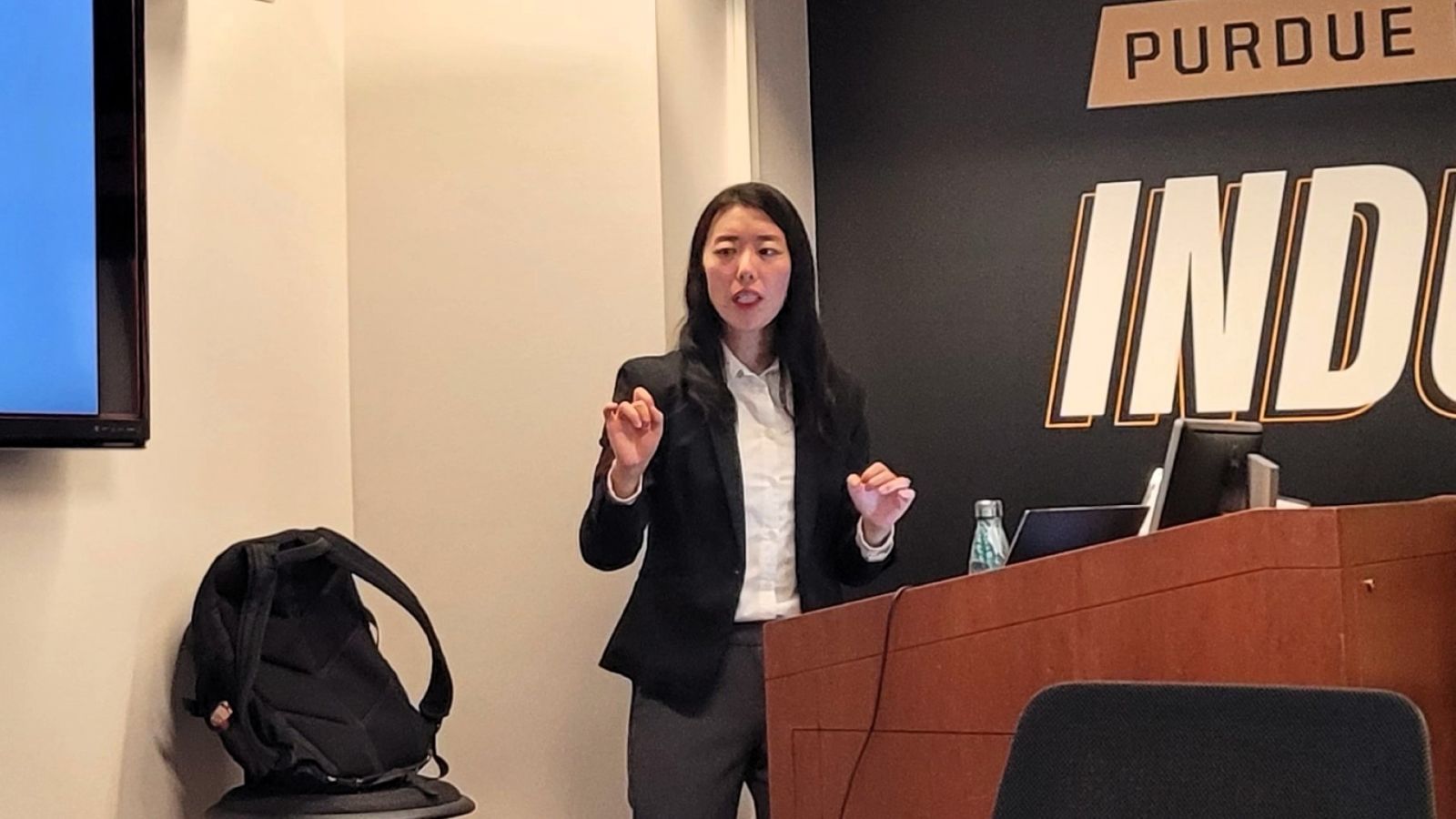Ph.D. student's dissertation aims to bring autonomy, competence, joy to older adults using technology - Purdue Polytechnic Institute

Chorong Park loves the intersection of people and technology. She realized her passion for helping older adults when she started volunteering in tech support sessions at local senior centers. Park put in more than 500 volunteer hours where she built personal relationships with people and saw an opportunity for research to benefit the community.
“Watching well-meaning kiosks, apps and gadgets repeatedly trip up people I care about—and seeing how a few simple design tweaks could restore confidence—sparked my drive to bridge technology and aging in a way that truly empowers,” Park said.
She focused her recently-completed dissertation on designing joyful and inclusive technology for older adults, specifically virtual reality (VR), augmented reality (AR), artificial intelligence (AI) and robotic companions.
The public has long perceived older adults as technology-illiterate, Park says, and in her research interviews, she discovered older adults experience frustration and damaged self-confidence and autonomy. She also heard interviewees, who were all 65 and older, express concern about surveillance through technology.
Park wondered if design bias was part of the problem, meaning design decisions consciously or unconsciously favored certain people groups. In the first parts of her research, she set out to examine the systems and mechanisms that stigmatize aging populations and explore how design practices can reinforce or disrupt ageist assumptions. Park’s weekly design studios with older adults specifically shaped her dissertation methods.
The final part of her research used an AR digital photo display system designed to support older adults in feeling remembered and emotionally connected to their loved ones. It offered insights into how small, thoughtful interventions—like receiving personalized, accessible AR digital postcards—could create moments of joy and belonging.
Park’s studies took place during more than 600 hours of volunteer engagement, supporting older adults with their technology-related challenges over three years in the West Lafayette and Lafayette, Indiana area. She collaborated across departments, including Computer Graphics Technology (CGT), Computer Science, and Gerontology, to ground theory in real-world needs, including co-design workshops in senior living communities and partnerships with Microsoft.
The outcome of her research? Park developed a set of design principles and participatory methods that transform negative experiences like shame, confusion, and fear into autonomy, competence and joy by combining Kansei Engineering, or emotional design, with critical disability frameworks.
“This work matters because as our population ages and healthcare moves online, inclusive design isn’t just nice to have,” Park said. “It’s essential to ensuring equitable access, reducing disparities in care and preserving dignity and independence.”
Park completed her Ph.D. in May 2025, and her dissertation titled “Trust, affection, and autonomy: Designing joyful and inclusive VR/AR, AI and robotic companions for older adults” will be available to the public in two years. She also completed a master’s degree at Purdue in user experience (UX) design.
Park was a 2025 recipient of a Purdue Focus Award, which recognized her for developing a tech support program serving disabled older adults throughout the Greater Lafayette area. The Focus Awards recognize those affiliated with Purdue University who have made an outstanding contribution to the furthering of Purdue University’s commitment to disability accessibility and disability diversity.
As a student, Park co-founded and led the Disabled Student Union, which advocated for accessible campus technologies and hosted hackathons to prototype adaptive devices. She also published and presented at IEEE’s VIS, a conference for the applications of visualization and visual analytics; the Association for Computing Machinery’s conference on Human Factors in Computing Systems; and ASSETS, a conference for presenting research related to computing for people with disabilities and older adults.
Park will continue her career at the University of Houston as a tenure-track assistant professor, where she’ll teach courses in human-centered design and accessibility, UX design, AR/VR for aging populations and human-robot/human-AI interaction.
She plans to continue her research to develop and validate conversational AI frameworks tailored to older adults’ needs for privacy, transparency and emotional engagement. Park also plans to prototype speculative AR/VR/robotic companions co-designed with long-term care residents to support social connection. NIH and NIA funding will be a key piece of support for scaling these inclusive technologies in healthcare and home care settings, Park says.
Park hopes to grow the community of people interested in partnering with the older adult and disability communities by leading a Community Co-Design Lab to train graduate students.
“Purdue’s interdisciplinary culture and emphasis on applied, community-engaged research have been transformative,” Park said. “Purdue’s support—funding, lab space, mentorship—made it possible to turn volunteer ideas into peer-reviewed publications and a growing pipeline of practical prototypes.”
Park wished to thank Rua Mae Williams, her advisor, for critical disability guidance and open, participatory methods; Christos Mousas for helping her understand VR/AR; Anastasia Ostrowski for early encouragement to explore privacy and ethics in robotics; Sooyeon Jeong for collaboration on human-robot interaction and privacy; and Paul Parsons for helping her understand creativity and fixation in data visualization.












